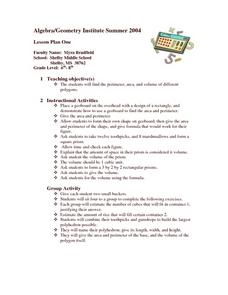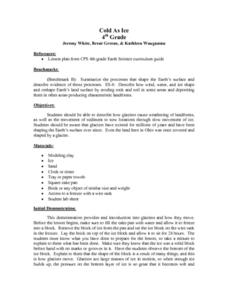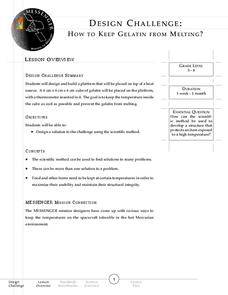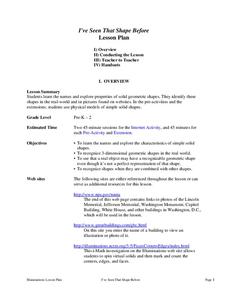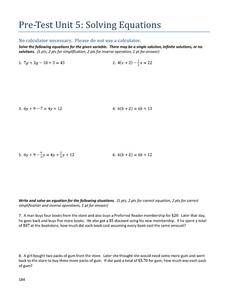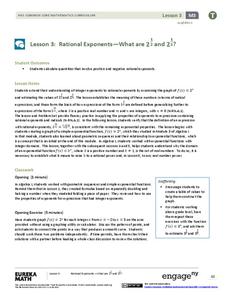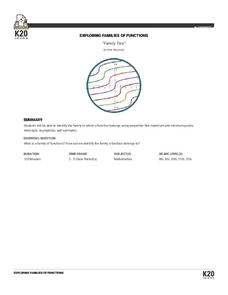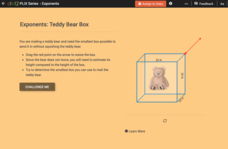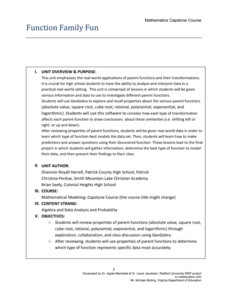Curated OER
Investigation - Dressing the Baby
Second graders complete an inquiry activity to determine how many combinations they can make using cut-outs of tops and bottoms. In this combinations and organized lists table, 2nd graders work with three colored cut-outs of tops and...
Curated OER
Lesson One: Perimeter, Area, Volume
Students explore perimeter, area and volume. Using geoboards, toothpicks, and marshmallows, students create specific shapes. They are directed to use formulas to find the volume, area, and perimeter of the created shapes. In groups,...
Curated OER
Jelly Beans for Sale
Students connect literature (story Jelly Beans for Sale by Bruce McMillan) to math concepts. In these estimating and money lessons, students work with jelly beans, unifix cubes, pennies, nickels, dimes, and quarters, to estimate and make...
Curated OER
Cold As Ice
Fourth graders investigate how glaciers cause the weathering of landforms. They observe a brick that has been placed on a frozen slab of ice, and discuss the results, comparing them to the movements of a glacier. In small groups, they...
Curated OER
Shapes
In this drawing the shapes learning exercise, students read the shape names in each square and draw the geometric shapes. Students draw six shapes.
Curated OER
Elements of Art
Students explore three topics of elements of art in this seven lessons unit. An overview of light, space, figure, ground, pattern, balance and symmetry are presented in this unit.
K12 Reader
Identifying Geometric Solids
After reading a short passage that identifies different types of geometric solids, kids answer a series of questions using information found in the article.
K12 Reader
Shapes on a Plane
Geometric shapes are the focus of a comprehension exercise that asks readers to examine a short passage about planes, circles, triangles, and rectangles, and then to respond to a series of questions about the article.
Messenger Education
Design Challenge: How to Keep Gelatin from Melting
The inside of the spacecraft Messenger, which explores Mercury, will experience temperatures from 32 to 91 degrees Fahrenheit. In the final installment of a series of four space-related activities, groups spend time discussing and...
CCSS Math Activities
Smarter Balanced Sample Items: 8th Grade Math – Target B
Develop a radical approach to covering the Smarter Balanced targets for 8th grade math with a presentation that helps further develop math skills. Seven sample items demonstrate the expectation for working with integer exponents,...
Mathematics Assessment Project
Representing Functions of Everyday Situations
Functions help make the world make more sense. Individuals model real-world situations with functions. They match a variety of contexts to different function types to finish a helpful resource.
Fayetteville Public Schools
I've Seen That Shape Before
The objectives in the resource allow students to explore the characteristics of simple solid shapes. Youngsters learn to recognize the face shapes, corners, and edges that make up 3-D figures by filling in a chart. Lastly, learners look...
Del Mar College
Formulas for Elementary and Intermediate Algebra
Give your scholars the support they need to work with formulas. A reference page offers definitions and picture examples of perimeter, area, surface area, volume, the Pythagorean theorem, a variety of shapes, and more.
Charleston School District
Pre-Test Unit 5: Solving Equations
Your pupils just may know more than you think they do! A pre-test assesses their ability to solve and write equations. It includes simple quadratic and cubic equations as well.
EngageNY
Rational Exponents—What are 2^1/2 and 2^1/3?
Are you rooting for your high schoolers to learn about rational exponents? In the third installment of a 35-part module, pupils first learn the meaning of 2^(1/n) by estimating values on the graph of y = 2^x and by using algebraic...
K20 LEARN
Family Ties: Exploring Families OF Functions
They say it runs in the family. Small groups use a card sorting activity to group graphs of functions into families. After grouping by families, the class develops conclusions for parent functions and create a graphic organizer.
Corbett Maths
Direct Proportion
Direct change by finding the constant. Using two known values within a direct proportion, the resource shows how to find the constant of proportionality. Once individuals do that, they then find any value given the other. The video works...
CK-12 Foundation
Whole Number Exponents: Teddy Bear Box
Five questions—multiple-choice, fill in the blank, and discussion—make up an interactive that challenges scholars to mail a teddy bear using the smallest box possible without squishing it. A box with movable sides allows mathematicians...
Radford University
Function Family Fun
It's time for a family reunion—function families, that is. Pupils first review different types of parent functions. They then see how to apply transformations to graphs and learn how to select the most appropriate type of function to...
Curated OER
Number: Index Notation
Students explore the concept of index notation. In this square root and cube root lesson, students examine number patterns as they complete a worksheet that requires them to calculate roots.
Curated OER
Volume
Students, after reviewing the measuring of the lengths of sides of different shapes along with the calculation of their perimeters and areas, encounter what it means by the 'perimeter' of a polygon. They practice measuring units of...
Curated OER
Graphs of Formulas
In this worksheet students fill out a function table after reading a short word problem. This is a good way for students to practice the necessary skills for solving word problems or setting up algebra equations.
Curated OER
Ship Shape
Second graders explore shapes and create a Silly Shape book. Students recognize that shapes have certain properties and be able to define them. Example, a triangle is any three-sided shape. Students' job is to make a picture on...
Curated OER
Color Me Square
Second graders identify and describe basic geometric solids. Working as a class, 2nd graders describe geometric solids using the proper vocabulary and counting faces, bases, corners, and edges. In pairs, students use a computer drawing...



